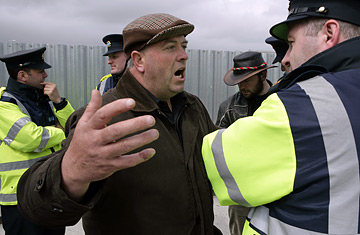
Willie Corduff confronts Garda officers at the "Shell to Sea" protest site in Ballinaboy, County Mayo.
"People wonder how we lived here. But we were self-sufficient. We didn't drink, we didn't smoke. Any little bit of money you had, you had to use wisely otherwise you had none," says Corduff, 53, drinking tea in his kitchen as he muses on the strange course of events that made him, first a jailbird, then a national hero and, earlier this month, took him to San Francisco to collect $125,000 as winner of the prestigious Goldman Environmental Prize.
Corduff is just back from The Hague, where he'd gone to the centennial AGM of the Anglo-Dutch oil giant Shell to berate the company over its plans to run a six-mile high-pressure gas pipeline through his neighborhood. The pipe would connect the massive Corrib gas field, 50 miles out to sea, to a 400-acre refinery being built in nearby Ballinaboy. When Shell's surveyors first showed up on his land in 2000, Corduff showed them the gate. By the time they returned in June 2005, armed with a compulsory purchase order, a court injunction and police guards, Corduff and his neighbors had become seasoned campaigners as versed in the legalities of public planning and in the environmental hazards posed by the pipeline as they were in the art of passive resistance.
And not-so-passive resistance: When a Shell worker made for his field to start pegging out the pipeline route, Corduff was having none of it: "I said 'If he goes in, I'm going in and if he's better than me he'll come out and if I'm better than him, I'll come out.' " Corduff was arrested and, along with four other local landowners, hauled before a judge 200 miles away in Dublin who, at Shell's insistence, imprisoned the men for contempt of court for violating the injunction against interfering with work on the pipeline. After the men, who remained defiant in court, had spent 94 days in prison, Shell backed down and withdrew the injunction. By then, of course, the Rossport Five, as they became known, had rallied nationwide support for their "Shell to Sea" campaign, aimed at forcing the company to adopt the more expensive alternative of processing the gas at sea. Violent clashes with the police at Ballinaboy and in Dublin made headline news, although more recently a certain weariness has set in. "You'll not find much support for them down here," says a head teacher from the south of the county. "I can understand why you wouldn't want it in your own back yard, but people down here are desperate for gas."
In a small victory for the Rossport campaigners, a court ruled Shell's original pipeline route was no longer legally enforceable, forcing the company to find an alternate route. But it is already forging ahead with construction on its Ballinaboy plant, which has now become the focus of the protesters' war of attrition.
As lorries stream through the steel gates carrying away tons of soft turf being stripped away in search of solid ground on which to build the Ballinaboy refinery, a handful of campaigners huddle nearby in a converted horse trailer, fortifying themselves with hot tea, iced buns and buttered fruit loaf. At the gates a few gardai stand around looking glum and bored, with a wistful eye perhaps on their colleagues in the warm, dry police van parked nearby. The arrival of a reporter and a photographer produces a flurry of activity. When a dozen or so protesters make for the gates, the police take their positions for the well-rehearsed daily standoff. Today Corduff and Monaghan challenge them over whether the few yards of land between the gates and the road are private or public property, and whose duty the police are doing. The tone is niggling and hostile, with much finger wagging and each side videoing and snapping the other. A sudden squall brings the rain hammering in horizontally, and eventually the protesters trudge with grim cheer back to the trailer, their job done for the day: for 20 minutes not a single lorry has entered or left Ballinaboy.
